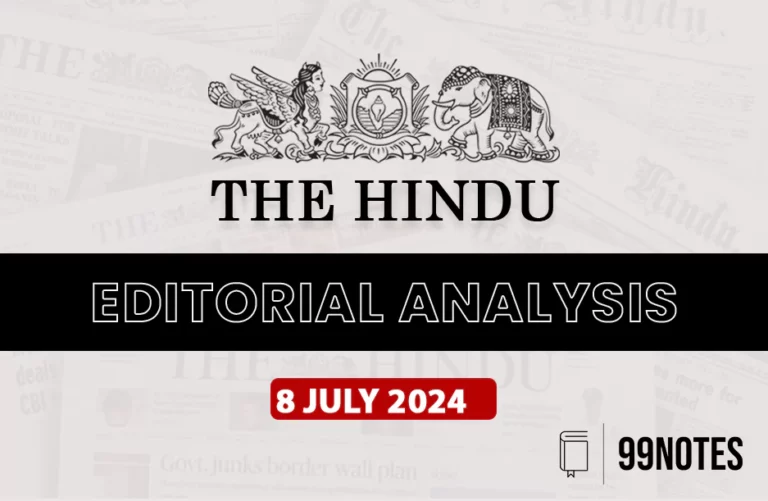26 February 2024 : The Hindu Editorial Notes PDF
The Hindu Editorial
26-February-2024
1. The Raisina Dialogue lacked diversity in conversations on foreign policy
| Topic: GS2 – International Relations UPSC Perspective: Raisina Dialogue insights crucial for aspirants, covering global governance, India’s diplomatic stance, and geopolitical dynamics. |
| Context |
| ● The article discusses the highlights of the ninth Raisina Dialogue, emphasizing India’s global role, diplomatic outreach, and focused discussions on conflicts, while noting notable absences and omissions. |
Raisina Dialogue 2024 Highlights: Aims and Ambitions
- The ninth edition of the Raisina Dialogue, an annual event by the Ministry of External Affairs, focused on engaging global leaders in discussions on significant global issues and challenges.
- External Affairs Minister S. Jaishankar emphasized India’s role as a “bridging power” with a “multi-vector” policy, acting as a global friend or “Vishwamitra.”
Global Leadership Perspectives: Connectivity and Governance
- Greek Prime Minister Kyriakos Mitsotakis inaugurated the event, highlighting the importance of connectivity projects like the India-Middle East-Europe Economic Corridor.
- Discussions delved into global governance, addressing issues such as inequality at the UN Security Council and the need for reforms.
- India’s position in global decision-making, expressed as the aspiration “to be a player, rather than a playing field,” was a recurring theme, with reference to its successful hosting of the G-20 in the previous year.
Diplomatic Outreach and Economic Partnerships
- Due to scheduling conflicts, major countries like the P-5, G-7, and BRICS-10 had no senior ministerial representation. However, Central and Eastern European ministers, including those from the Baltic-Nordic forum, offered a new diplomatic outreach for India, exploring trade agreements and investment ties.
Focused Discussions on Global Conflicts: Russian War and China’s Aggression
- The predominant discussions centered on global conflicts, with a spotlight on the Russian war in Ukraine. Panels on military and naval strategy underscored the imperative to address an assertive China.
- However, the absence of invitations to Russia and China resulted in a lack of balance in these conversations.
Notable Absences and Omissions: Lack of Diversity in Conversations
- The event lacked significant representation from South East Asia, Latin America, and South Asia, excluding Nepal and Bhutan.
- Discussions on democracy avoided debates within India, but the absence of non-governmental civil society organizations limited perspectives on global democracy challenges.
- Notably absent were conversations on the Israeli war in Gaza, leading to a lack of diversity in discussions and potentially diminishing the forum’s role as a “Made in India” version of the “Global Public Square,” as observed by Minister Jaishankar.
Conclusion
- In conclusion, the Raisina Dialogue 2024 showcased India’s diplomatic ambitions and global engagements.
- While addressing conflicts and asserting its role, the forum also highlighted the need for diverse perspectives and inclusive discussions on pressing global issues.
| What is Raisina Dialogue? |
|
| Practice Question: Discuss the significance of India’s ‘bridging power’ role, as highlighted in the Raisina Dialogue 2024, in shaping global governance and diplomatic engagements. (250 words/15 m) |
2. Space is an area that necessitates expansive collaboration
| Topic: GS3 – Science and Technology, GS2 – International Relations UPSC Perspective: Moon landings’ global trends showcase technological prowess, international collaborations, and the evolving role of the private sector in space exploration. |
| Context |
|
Introduction and Global Trends in Moon Landings
- Moon landings, a renewed focus globally, witness diverse participation, showcasing technological advancements and different definitions of success.
ISRO’s Success with Chandrayaan-3
- Chandrayaan-3’s successful soft-landing affirms ISRO’s competence, marking India’s emergence as a significant space research and flight provider.
Learning from Luna 25 Mission
- Luna 25’s setback provides valuable lessons for Russia’s Roscosmos, prompting reflections on technological challenges and the agency’s reputation in decline.
Private Sector Breakthrough: Intuitive Machines
- Intuitive Machines (IM) achieves a milestone as the first private company to soft-land a robotic craft on the moon, highlighting the evolving role of the private sector in space exploration.
IM’s Odysseus and NASA’s CLPS Program
- IM’s Odysseus, part of NASA’s Commercial Lunar Payload Services (CLPS) program, faced technical challenges during descent, showcasing the complexities of private involvement in lunar missions.
- The success of CLPS missions, supported by NASA, emphasizes the potential for private companies to contribute significantly to lunar exploration.
Implications for NASA and CLPS Program
- IM’s success underscores the significance of a diversified private space service landscape, crucial for the sustainability and growth of initiatives like the CLPS program.
- NASA’s limited role in CLPS missions, primarily focused on selecting landing sites and providing payloads, showcases the evolving dynamics of collaboration between governmental agencies and private entities.
Global Collaboration and India’s Initiatives
- The global space arena demands extensive collaboration, both internationally and domestically.
- India’s recent approval for up to 100% automatic foreign direct investment in its space program sets the stage for increased competition among Indian startups, potentially alleviating the burden on ISRO in the future.
Conclusion
- In conclusion, the global landscape of moon landings, marked by successes and setbacks, illuminates the evolving dynamics in space exploration, emphasizing the integral roles of private enterprises and international cooperation in shaping the future of lunar missions.
| Government – Private sector Participation in space exploration |
Advantages:
Challenges:
Way Forward:
|
| Practice Question: Critically analyse the potential of government-private sector partnerships (PPP) in accelerating India’s space exploration, highlighting both the advantages and challenges associated with such collaborations. (250 words/15 m) |
For Enquiry

26 February 2024 : The Hindu Editorial Notes PDF

26 February 2024 : PIB Summary for UPSC

26 Feb 2024 : Indian Express Editorial Analysis

Administrative Unification under the British Empire

24 Feb 2024 : Daily Current Affairs Quiz

24 Feb 2024 : Daily Answer Writing

24 Feb 2024 : Daily Current Affairs

24 February 2024 : The Hindu Editorial Notes PDF

24 Feb 2024 : Indian Express Editorial Analysis

24 February 2024 : PIB Summary for UPSC
Feb 2024 The Hindu 26 February 2024 : The Hindu Editorial Notes PDF The Hindu Editorial
24-February-2024
1. Courts must act against governments issuing blocking orders…
feb 2024 PIB 26 February 2024 : PIB Summary for UPSC PIB Summary for UPSC
26 February -2024
1. INDIA-JAPAN JOINT EXERCISE ‘DHARMA GUARDIAN’ COMMENCES IN…
Indian Express 26 Feb 2024 : Indian Express Editorial Analysis Indian Express Editorial Analysis
26-February-2024
1. In poll year, a data question
Topic: GS2 – Governance…
Modern India Administrative Unification under the British Empire Administrative Unification under the British Empire
The establishment of the British Empire allowed not…
Daily Quiz 24 Feb 2024 : Daily Current Affairs Quiz 24 Feb 2024 : Daily Quiz…
mains answer writing 24 Feb 2024 : Daily Answer Writing Mains Answer Writing
24-February-2024
Q1) “The true function of a legislature is to discuss and…
Daily Current Affairs 24 Feb 2024 : Daily Current Affairs Daily Current Affairs
24-February-2024- Top News of the Day
1. India Amends Surrogacy Rules, Allowing…
Feb 2024 The Hindu 24 February 2024 : The Hindu Editorial Notes PDF The Hindu Editorial
24-February-2024
1. Courts must act against governments issuing blocking orders…
Indian Express 24 Feb 2024 : Indian Express Editorial Analysis Indian Express Editorial Analysis
24-February-2024
1. A war of attrition
Topic: GS2 – International…
feb 2024 PIB 24 February 2024 : PIB Summary for UPSC PIB Summary for UPSC
24 February -2024
1. President’s greetings on the eve of birth anniversary…




